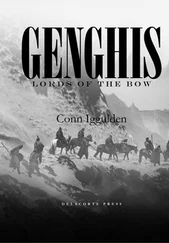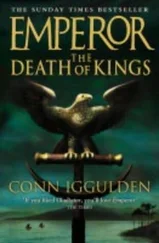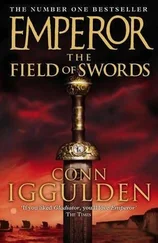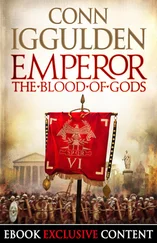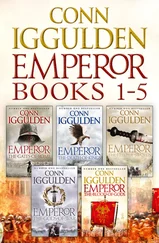Conn Iggulden - The Gods of war
Здесь есть возможность читать онлайн «Conn Iggulden - The Gods of war» — ознакомительный отрывок электронной книги совершенно бесплатно, а после прочтения отрывка купить полную версию. В некоторых случаях можно слушать аудио, скачать через торрент в формате fb2 и присутствует краткое содержание. Жанр: Исторические приключения, на английском языке. Описание произведения, (предисловие) а так же отзывы посетителей доступны на портале библиотеки ЛибКат.
- Название:The Gods of war
- Автор:
- Жанр:
- Год:неизвестен
- ISBN:нет данных
- Рейтинг книги:5 / 5. Голосов: 1
-
Избранное:Добавить в избранное
- Отзывы:
-
Ваша оценка:
- 100
- 1
- 2
- 3
- 4
- 5
The Gods of war: краткое содержание, описание и аннотация
Предлагаем к чтению аннотацию, описание, краткое содержание или предисловие (зависит от того, что написал сам автор книги «The Gods of war»). Если вы не нашли необходимую информацию о книге — напишите в комментариях, мы постараемся отыскать её.
The Gods of war — читать онлайн ознакомительный отрывок
Ниже представлен текст книги, разбитый по страницам. Система сохранения места последней прочитанной страницы, позволяет с удобством читать онлайн бесплатно книгу «The Gods of war», без необходимости каждый раз заново искать на чём Вы остановились. Поставьте закладку, и сможете в любой момент перейти на страницу, на которой закончили чтение.
Интервал:
Закладка:
Julius had nodded at the news as if it was no more than he had expected, and Cicero had known despair. He had not missed the significance of Julius holding his son up to the voracious mob. The man had no true peers to lay a hand on his shoulder and force him to caution. Cicero wondered if Caesar's Triumphs would include the boy to ride with him and whisper "Remember, you are mortal" into his ear.
The bronze doors creaked and Cicero jerked around to see who dared to breach the privacy of the Senate. Surely there were guards outside? He would not have been surprised to hear they had succumbed to drink and the hysterical crowd were stumbling in to vomit in the halls of their masters.
"Who is there?" he called, ashamed to hear the quaver in his voice. It was the nervous tone of an old man, he thought bitterly.
"Suetonius," came a reply. "I tried your home, but Terentia said you had not come back. She is worried about you."
Cicero sighed aloud in a mixture of relief and irritation. "Can a man not find a little quiet in this city?" he demanded.
"You should not be sitting in the dark," Suetonius replied, walking out of the gloom. He could not meet Cicero's eyes at first and the air of defeat hung heavily around him. He too had been there to hear Caesar speak.
Outside, someone began an ancient song of lost love and the crowd in the forum joined the single voice. The harmonies were rough, but beautiful nonetheless. Cicero was tempted to go out and add his broken wind to theirs, just to be part of it before the day brought back its hard realities.
Suetonius tilted his head to listen. "They don't know him," he whispered.
Cicero glanced up, shaken from his thoughts. In the semidarkness, Suetonius's eyes were shadows.
"Are we to be his servants, then?" he asked. "Is that all we have achieved?"
Cicero shook his head, more for himself than for his companion. "You must practice patience in this city, Senator. It will remain long after we are all dead."
Suetonius snorted in disgust. "What do I care for that? You heard his plans, Cicero. You nodded your head with all the others who would not dare speak up."
"You did not speak," Cicero reminded him.
"Alone, I could not," Suetonius snapped.
"Perhaps we all felt alone, even as you did."
"He needs us, to rule," Suetonius said. "Does he think our dominions will run themselves? Did you hear one word of thanks for the work we have done in his absence? I did not."
Cicero found himself growing angry at the whining tone that reminded him of his children. "He does not need us," he snapped. "Can't you understand? He has armies loyal only to him and he has taken the mantle of power. We are the last embers of the old Rome, fanning ourselves alive with our own breath. The great men are all dead now."
In the forum, he heard the song reach its final poignant lines before a wave of cheering broke out.
"What do we do then?" Suetonius asked.
His voice was plaintive and Cicero winced to hear it. He did not answer for a long time.
"We find some way to bind him to us," he said at last. "The people love him today and tomorrow, but after that? They will have spent the money he gives them and they will need more than dreams to fill their stomachs, more than golden promises. Perhaps they will even need us again."
He rubbed his sandal on the polished floor as he thought. The weakness of the younger man had stung him into anger and his thoughts came faster.
"Who else can pass the laws he wants, or grant him honors? They do not come simply because he shouts it in the forum. It is a weight of centuries that he has pushed aside. It may yet swing back with even greater force."
"So that is how you respond?" Suetonius asked. Cicero could hear the sneering tone and it infuriated him. "We shall resist him by passing every law? By honoring him further?"
With an effort, Cicero controlled his temper. He had so few allies now. Even a man of this caliber could not be scorned.
"If we balk his will, we will be swept away. This Senate house will fill again in hours with men more willing to bow their heads. Where is the gain in such a course?" He paused to wipe sweat from his face. "We must never let him see he can walk alone. He suspects it already, but he does not know it in his stomach, where it matters. If you told him he could disband the Senate on a whim, he would be appalled. It is a dangerous line to walk, but while we stand as a body, there is hope. If we force his hand, there is none."
"You are frightened of him," Suetonius said.
"So should you be," Cicero replied.
CHAPTER 33
In gardens that had once belonged to Marius, Julius sat by a fountain, rubbing his thumb over a thick gold coin. Brutus munched on a chicken leg, enjoying the peace. The daily Senate meeting would already have resumed, but neither man felt any urgency. Unseasonable heat had come to Rome, long after the summer had ended. With the new spring only a month away, the short days should have been wet and cold, but instead the Tiber had shrunk and the city suffered in thick air and heat. While Rome baked, Julius and Brutus had eaten and slept. The cool of evening would dispel the pleasant lethargy, but for the moment they were content to lounge in the sun, each lost in his own thoughts.
Brutus saw the small movement of Julius's fingers and reached out for the coin, grunting as Julius passed it over.
"It makes you look a little thinner than you really are," he said, holding the aureus up to the sun. "And I notice you have more hair."
Julius touched his head self-consciously and Brutus flipped the coin back to him.
"It still amazes me sometimes," Julius said. "This coin will travel for thousands of miles, through the hands of strangers. Perhaps long after me, someone will hand a copy of my face over in exchange for a saddle or a plow."
Brutus raised an eyebrow. "The face, of course, will give it value, not the gold," he said.
Julius smiled. "All right, but it's still strange to think of men and women I will never meet-who will never see Rome even-but who will carry my face in their purses. I hope they do give it a glance before they exchange it."
"You expect too much of people. You always did," Brutus said seriously. "They'll take the land and coin you give them and next year they'll be back to clamor for more."
Julius raised a hand, shutting weary eyes. "Is this the colonies again? I've heard the speeches from Suetonius. He called it corruption to give the poor of Rome their dignity. You tell me how it damages a man to give him a little land and coin to get the first crop in the ground? With my own funds I gave eighty thousand a new chance in life, and the only protests came from the pampered men of my own Senate." He snorted in indignation. "It's been a year, Brutus; have the exiles come back yet? Have they turned up as beggars in the forum? I haven't seen them." He frowned fiercely, waiting to be contradicted.
Brutus shrugged, tossing the chicken bone over his shoulder to land in the fountain. "For myself, I have never worried whether some peasant farmer will live or die. Some will starve or gamble away what you gave them. Others will be robbed. Perhaps a thousand will survive the first year working a trade they don't understand. Rome has fewer beggars, though, which is pleasant. I can't argue with you there."
"Suetonius described it as both 'courageous and flawed,' as if it were a child's idea."
"They did not try to stop you," Brutus said.
"They wouldn't dare to try!" Julius snapped. "I could count the useful minds in the Senate on one hand. The rest are fawning idiots who can't see further than their own vanity."
Brutus looked sharply at the man he had known for so many years. "Can they be anything else? They are the Senate you wanted. They raise statues to you over Rome and invent new honors just for a nod of approval from you. Were you expecting passionate debate when just a word could have them dragged out by your guards? You've made them what they are, Julius." He reached over to take the coin again, reading from it. "They have made you 'Dictator Perpetuus,' and now they are struggling to find more pretty words to gild your name. How it must sicken you."
Читать дальшеИнтервал:
Закладка:
Похожие книги на «The Gods of war»
Представляем Вашему вниманию похожие книги на «The Gods of war» списком для выбора. Мы отобрали схожую по названию и смыслу литературу в надежде предоставить читателям больше вариантов отыскать новые, интересные, ещё непрочитанные произведения.
Обсуждение, отзывы о книге «The Gods of war» и просто собственные мнения читателей. Оставьте ваши комментарии, напишите, что Вы думаете о произведении, его смысле или главных героях. Укажите что конкретно понравилось, а что нет, и почему Вы так считаете.



